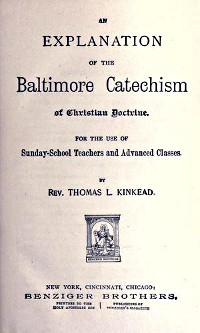
Lesson 20
| *224 | Q. | What should we do on entering the confessional? |
| A. | On entering the confessional we should kneel, make the Sign of the Cross, and say to the priest: “Bless me, Father”; then add, “I confess to Almighty God, and to you, Father, that I have sinned.” |
| *225 | Q. | Which are the first things we should tell the priest in confession? |
| A. | The first things we should tell the priest in confession are the, time of our last confession and whether we said the penance and went to Holy Communion. |
| *226 | Q. | After telling the time of our last confession and Communion, what should we do? |
| A. | After telling the time of our last confession and Communion we should confess all the mortal sins we have since committed, and all the venial sins we may wish to mention. |
“We may wish.” We should tell every real sin we have never confessed. If we have no mortal sin to confess, it is well to tell some kind of mortal sin we have committed in our past life, though confessed before. We should do this because when we have only very small sins to confess there is always danger that we may not be truly sorry for them, and without sorrow there is no forgiveness. But when we add to our confession some mortal sin that we know we are sorry for, then our sorrow extends to all our sins, and makes us certain that our confession is a good one. If you should hear the sin of another person while you are waiting to make your own confession, you must keep that sin secret forever. If the person in the confessional is speaking too loud, you should move away so as not to hear; and if you cannot move, hold your hands on your ears so that you may not hear what is being said.
| *227 | Q. | What must we do when the confessor asks us questions? |
| A. | When the confessor asks us questions, we must answer them truthfully and clearly. |
| *228 | Q. | What should we do after telling our sins? |
| A. | After telling our sins we should listen with attention to the advice which the confessor may think proper to give. |
The priest in the confessional acts as judge, father, teacher, and physician. As judge he listens to your accusations against yourself, and passes sentence according to your guilt or innocence. As a father and teacher he loves you, and tries to protect you from your enemies by warning you against them, and teaching you the means to overcome them. But above all, he is a physician, who will treat your soul for its ills and restore it to spiritual health. He examines the sins you have committed, discovers their causes, and then prescribes the remedies to be used in overcoming them. When anything goes amiss with our bodily health we speedily have recourse to the physician, listen anxiously to what he has to say, and use the remedies prescribed. In the very same way we must follow the priest’s advice if we wish our souls to be cured of their maladies. Just as a person who is unwell would not go one day to one physician and the next day to another, so a penitent should not change confessors without a good reason; and if you have any choice to make let it be made in the beginning, and let it rest on worthy motives. In a short time your confessor will understand the state of your soul, as the physician who frequently examines you does the state of your body. He will know all the temptations, trials, and difficulties with which you have to contend. He will see whether you are becoming better or worse; whether you are resisting your bad habits or falling more deeply into them; also, whether the remedies given are suited to you, and whether you are using them properly. All this your confessor will know, and it will save you the trouble of always repeating, and him the trouble of always asking. Thus the better your confessor knows you and all the circumstances of your life, the more will he be able to help you; for besides the forgiveness of your sins there are many other benefits derived from the Sacrament of Penance.
But if at any time there should be danger of your making a bad confession to your own confessor – on account of some feeling of false shame – then go to any confessor you please; for it is a thousand times better to seek another confessor than run the risk of making a sacrilegious confession.
Never be so much attached to any one confessor that you would remain away from the Sacraments a long time rather than go to another in his absence.
You should not consider the person in the confessional, but the power he exercises. You should be anxious concerning only this fact: Is there a priest there who was sent by Our Lord? Is there a minister of Christ there who has power to pardon my sins? If so, I will humbly go to him, no matter who he is or what his dispositions.
| *229 | Q. | How should we end our confession? |
| A. | We should end our confession by saying, “I also accuse myself of all the sins of my past life,” telling, if we choose, one or several of our past sins. |
| *230 | Q. | What should we do while the priest is giving us absolution? |
| A. | While the priest is giving us absolution, we should from our heart renew the Act of Contrition. |
All, especially children, should know this act well before going to confession.
























I do worry that if a person struggles with scrupulosity as I have, that repeating a previously confessed mortal sin is such a good idea. Some struggle to believe they are really forgiven and for those folks, bringing up past mortal sins may not be beneficial. I reslize the Balt Catechism was written before the understandings of mental illness OCD etc have been further elucidated, so i dont mean to criticize.